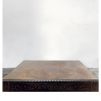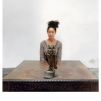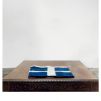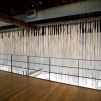CACT E-STUDIO
Born in1951 inThessaloniki. She studied painting and sculpture at the École des Beaux-Arts of Grenoble, and psychopathology at the Universities Paris V andGrenoble. She lives and works inAthensandParis.
Lydia Dambassina: Party’s Over – Starts Over
The work consists of pictures accompanied by brief texts: the images reside in the boundary separating “normal” and “paradox”. The texts isolate what we might have passed by unwillingly and indifferently. However, neither the picture serves as an illustration of the text, nor is the text a caption of the image. Something new is born, to test our fears and agonies, to warn and also protect us, to make us aware that the security of privacy is an illusion and that, in the end, everything -feelings, expectations and secrets- will one day come to light. They will be tested in the public sphere of exchanges and communication, by the violence of the crisis, destined to be wounded.
Her work is impressively disciplined and coherent, while Lydia Dambassina, discretely and through the use of quotations, will record the incident of the wounding. These textual and visual fragments compose narrations which confess the lyrical quality of the unresolved effort, the ethics of the impasse. The wounds are numerous and even angels break their wings; Pina Bausch is an angel.
Lydia Dambassina’s origins are rooted in conceptual art. Her initial idea leads her to contemplate and create a series of images with a literary disposition, where words produce narrative tensions and the alternation of pictures dictates the sequence of narration. This is however a kind of conceptual art, where the powerful initial idea co-exists with impeccable technique, which is testified by the flawless professional studio photo shoot. There is a mutual relationship linking the aesthetic aspect of her work and the cognitive value, while the element of beauty is at the same time present and inaccessible. Despite the feelings of awe it inspires, it remains beautiful – in fact it occasionally becomes magically beautiful.
We have read newspapers and isolated phrases and extracts which inevitably had a different, personal meaning to us. We have also seen images and observed and magnified details, because they spontaneously reminded us of something else. Here, however, the image is created and along with the excavated text it forms a coherent body which is addressed to all and each and every one of us, to remind us what we are going through today – to highlight what the really important news is. Current events are not dealt neither with the conventional lightness of the media nor with the superficial view that the morrow can easily change the flow of ephemeral events or weaken our memory. Current events acquire qualities of ontological philosophy and showcase existential questions.
Is it about the “Feast in the Time of Plague” and the voices from the festive table joining the ones of the memorial ceremony?
Or is it “Τhe Masque of the Red Death”, with Prospero and the thousand nobles making a futile attempt to stave off death?
Lydia Dambassina knows that the classics of literature have already dealt with the story of such a value-devouring feast. She does not attempt to rewrite it, nor does she consume herself in teachings and allegories. Besides, the ambiguous phrase “Party Starts Over”, which encircles the narration, anticipates the future, revises the meaning of “the party, which empties, darkens and in the end eradicates the table”, is rather a call addressed to us, asking us to think on novel structures of solidarity and co-existence, instead of being caught up in a vicious circle.












